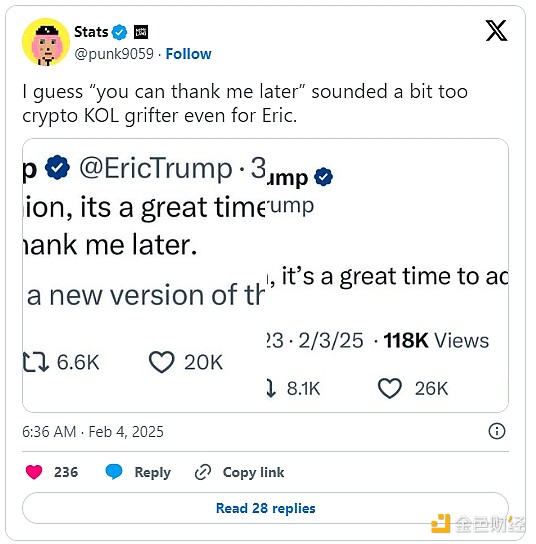
Author: Katherine Ross, Blockworks; Translated by: Wuzhu, Golden Finance
ETH has a hard time.
This did not start with the sell-off this weekend. We have “wartime” Vitalik Buterin, criticism of the Ethereum Foundation, not to mention price action (down 10% in the past week).
On the positive side, at least Eric Trump still seems optimistic, and – in a post now edited on X – initially encouraged people to buy ETH, adding “You can thank you later I". But I'm not sure if this is the type of support anyone wants right now.
There are a lot of discussions about where something went wrong and how to correct it. Evan Park of Tribe Capital told me that the mood hasn’t been new lately.
“When I was at Devcon, I noticed that the foundation focused on infrastructure, while retail users and the wider crypto community demanded exciting new applications, there is a huge amount between the two The disconnection. On the one hand, ETH L2 such as Base, Ink and MegaETH are positioned to introduce new applications and users. However, what Ethereum leaders need to realize is that they are facing new L1s such as Solana and new L1s such as Berachain and Monad These L1s are expected to dominate the next year,” he explained.
Even though Buterin emits a “greater sense of urgency”, we are still in a moment when the market ‘can’t stop, won’t stop’. Just yesterday, Berachain announced that its mainnet will be launched tomorrow.
In my conversation with Ryan Connor of Blockworks Research, he explained that he and his team were initially “excited” about Max Resnick’s potential cultural impact on ETH. But when all this fails and Resnick jumps to Solana, the excitement fades away.
The situation is now “pretty bad” after Resnick left, but Connor told me there is still a way to make ETH great again.
"Bring execution back to the base layer is the simplest way to say. How do you do it? You are technically expanding. You compete with L2. You change the culture of the ETH organization, the people who release upgrades, and life App developers on that chain. [This] is easier said than done. You have to basically give up these very niche, philosophical views that many people in the ecosystem hold, [although] I think it’s clear that they are reluctant to do that over the years,” he explained.
This includes putting the focus of "hardware requirements" aside.
Although you can do some technical things, you still have to change your culture in the end. Connor admits that this is not an easy battle to win.
Connor compared it to the Motor Vehicle Administration: No matter who is in charge of the department, they can’t turn on “wartime” mode and change everything. Unfortunately, it doesn't work that way.
Whether Buterin and EF are translated to a similar level to the sector remains to be seen.











